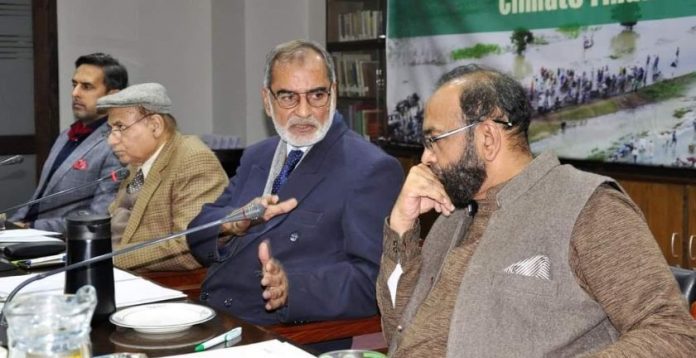ISLAMABAD, DEC 18 (DNA): Pakistan’s own environmental governance structure needs to be comprehensively operationalized to seek assistance through international climate financing, especially the ‘loss and damage’ fund ahead of COP27. The long awaited Climate Change Authority should be created without any further delay as mitigating climate change disasters and seeking climate financing and compensation from the international community needs comprehensive policy, legislative and governance mechanisms at all the levels of the state.
This was demanded during a dialogue, titled ‘Post COP27 Strategy for Pakistan: Climate Financing and De-carbonization’, organized by the Institute of Policy Studies (IPS) to deliberate on necessary mitigation and adaptation measures to tackle the crises arising from climate change following the 27th UN climate change conference held in November in Egypt.
The session, chaired by Mirza Hamid Hassan, chairperson, IPS Steering Committee on Energy, Water and Climate Change, and former federal secretary, Ministry of Water and Power, was addressed by Khalid Rahman, chairman IPS, Dr. Muhammad Irfan Khan, dean, Environmental Sciences, International Islamic University Islamabad (IIUI), Syeda Hadika Jamshaid, climate policy specialist, Ministry of Climate Change, Syed Aqeel Hussain Jafri, director, Policy and International Cooperation, Alternative Energy Development Board, Dr. Shafqat Munir Ahmed, director, Resilient Development Program, SDPI, Dr. Kanwar Muhammad Javed Iqbal, general secretary, Pakistan Panel for Climate Change (PPCC) and Lubna Riaz, researcher, IPS.
The experts deplored that despite the passage of the Climate Change Act 2017 the formation of Climate Change Authority and Climate Change Council still seems an uphill task. They were of the view that the Council of Common Interests (CCI) and other concerned bodies should prioritize this critical national issue.
While sharing insights on climate financing, the speakers acknowledged Pakistan’s advocacy and role at COP27 in making the international community, particularly the developed world, realize the disastrous consequences of climate change and the need for loss and damage financing for vulnerable countries. This realization marks active progress toward the cause; however, Pakistan must take conclusive actions at the national level as well because whatever the climate compensation may be, it would not ensure future security against climate-induced afflictions, argued the speakers. With an increasing poverty rate and poor human development, this has become particularly significant as Pakistan would remain vulnerable in the future.
As part of the future-oriented solutions to the crises triggered by climate change, it is important to adopt green measures within society as well as corporate sectors, along with formulating indigenous mechanisms and legislation, they advised.
Moreover, as observed by the experts, the recovery from the floods including reconstruction and social development is estimated to require $16 billion while the secondary recovery costs, including medical care and food supply, would surpass this figure. Therefore, things can’t get better just with climate financing.
While highlighting the de-carbonization strategy, the speakers maintained that Pakistan has already presented itself as a responsible nation by committing to decarbonizing the power sector through renewable energy transition and aiming to achieve the goal of 60 per cent share of non-fossil fuel-based power generation by the end of this decade. Though such adaptation measures to the climate change impacts are the elementary necessity of time; in order to prepare for the future, mitigation measures are equally crucial.
The speakers further stressed the need to reform the policy, legal, and institutional frameworks for better environmental governance, which is also a prerequisite to the efficient dispersal of climate finances in the country. As Pakistan would remain vulnerable in the future, the stakeholders must continue to negotiate, lobby, and advocate for the cause in every capacity possible at the international level.
In this regard, a climate authority must be established to ensure the proper management of the funds through the right strategies, stressed the experts. These strategies may be quantified into short, medium, and long-term initiatives for proper disaster recovery.
Furthermore, the dissection of the losses from the climate disaster for the dispersal of funds should be based on correct data on life causalities, monetary loss, food scarcity, and medication requirements in the disaster-hit areas.
Concluding the session, Khalid Rahman maintained that every stakeholder needs to build on the efforts for mitigating climate-induced vulnerability and disasters with increased momentum. Moreover, in order to advance the successful outcomes of efforts against damages due to climate, there is a dire need to strengthen climate change governance and resilience against climatic threats.
He further highlighted that the international development paradigm is marked with a dilemma, in which states want to resolve climate change and its consequences while also aiming for growth-led production, which is inherently the cause of climate change. This dilemma of the international development paradigm should be challenged and be made a point of agenda in discourses and efforts against climate change.=DNA
=========

















